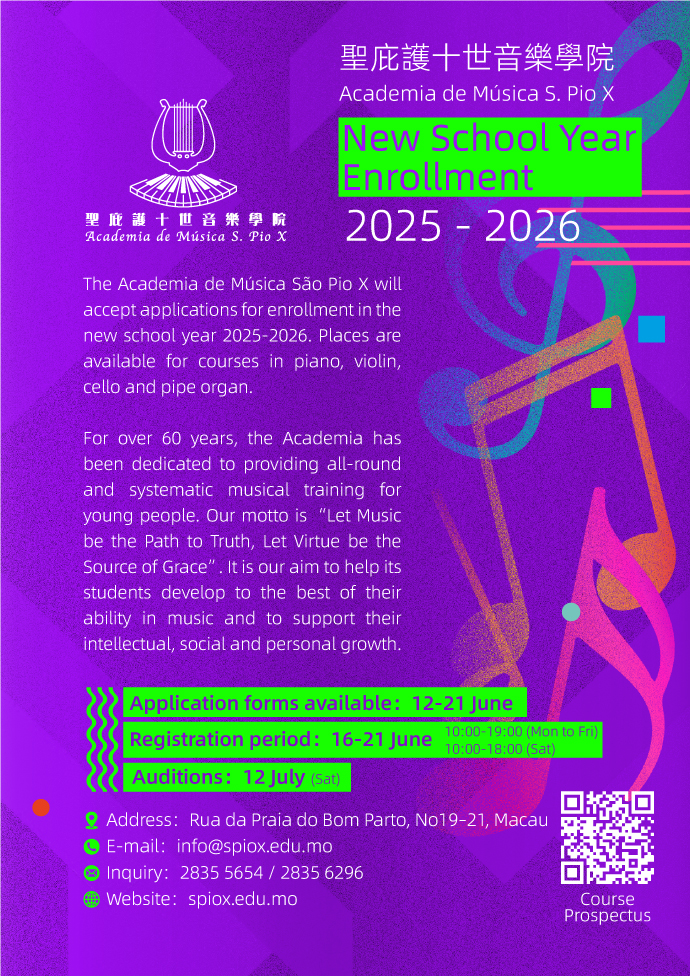Enrollment
Introduction
Established in 1962 by Fr. Áureo Castro, the Academia de Música São Pio X, under the Macau Catholic Diocese, is the first music school in Macau providing systematic musical training for talented young people.
The Academia stresses music and arts education as an integral part of holistic education. Learning music will improve a child’s ability to think, reason, create, and express; as well as develop coordination, self-esteem and social skills. The Academia has a supportive, stimulating environment and a team of experienced, dedicated teachers, and pupils are encouraged to learn how to concentrate, listen, and engage their imagination with music. A high number of students go on to study music at university level, and many who chose to pursue professional careers in medicine, science, law etc continue to have a serious love for music.
The curriculum is designed to give students a balanced exposure to the discipline of music. In addition to the regular instrumental tuition and musicianship classes, students have many opportunities to take part in different performances in the Academia and outside concert venues. The Academia also regularly organizes masterclasses, lectures, workshops and concerts by distinguished musicians and artists which are open to the public.
In September 2021, the Academia had relocated to Rua da Praia do Bom Parto (the former Matteo Ricci College Primary Section). Additional space, resources and facilities in the new campus will enable the Academia to develop strategically in many areas, and further contribute to the cultural aspirations of Macau.
Academia Motto
The Academia has adopted the Chinese motto「以樂載道,以德惟馨」(‘Let Music be the Path to Truth, Let Virtue be the Source of Grace) which refers to the cultivation of universal virtues that are the basis for the development of a meaningful life. It is the aim of the Academia to help its students develop to the best of their ability in music and to support their intellectual, social and personal growth.
Application Procedures
Course Introductions, Exam Details, and Application Forms for the 2025–2026 Academic Year will be available, June 12–21 (during office hours) at the college office or Downloadable on this website.
Events | Dates | Remarks |
Application forms available | 12-21 June 2025 | Download |
Registration period | 16-21 June 2025 | Registration hours: Mon to Fri 10:00-19:00, Sat 10:00-18:00 (Please note application forms will be accepted only during the above hours) |
| Auditions | 12 July 2025(Sat) | Audition time to be notified by SMS on |
Notification of audition results | 21 July 2025 (Mon) | Results will be announced on the Academia website |
Enrollment | 21-26 July 2025 | .Accepted students should collect tuition payment slip during this period .Non-payment by 26 July will be deemed as relinquishing of place offer. .Please make the tuition payment through ICBC Mobile Banking App. Easy Transfer or ATM transfers are not accepted |
Auditions
Entry is competitive by audition. Musical potential, suitability for the course, and the number of places available, are all taken into consideration.
| Music Levels | Audition Content |
| No prior music training/ learning an instrument for less than 6 months | 1. Sing a song of your own choice without accompaniment 2. Tests in musical aptitude including pitch and rhythm will also be given |
| Already learning an instrument (ABRSM Grade 3 or below) | 1. Play a piece of your own choice on the music instrument you applied for (please have the music available for the examiners) 2. Music aptitude tests and sight-singing will also be given |
| Already learning an instrument (ABRSM Grade 4 or above)* | Piano: 1. Play a piece of your own choice (please have the music available for the examiners) 2. Own choice of a major scale and a minor scale (harmonic or melodic) and arpeggios of the same chosen key (not C, G, F major and A, E, D minor), all to be played 2 octaves 3. Music aptitude tests and sight-reading will also be given |
| Violin: 1. Play a piece of your own choice (please have the music available for the examiners) 2. Own choice of a major scale and a minor scale (harmonic or melodic) and arpeggios of the same chosen key, to be played at least 2 octaves or above. If the following keys are chosen, changing positions must be included: Major: G, Ab, A, Bb, B / Minor: G, G#, A, Bb, B 3. Music aptitude tests and sight-reading will also be given |
|
| Cello: 1. Play a piece of your own choice (please have the music available for the examiners) 2. Two octaves scales and arpeggios Major: F, Bb, Eb, A (choose one) Minor: G (harmonic or melodic) OR Three octaves scales and arpeggios Major: C, D (choose one) Minor: C, D (harmonic or melodic) (choose one) 3. Music aptitude tests and sight-reading will also be given |
|
| * (All music instruments) Applicants with ABRSM Grade 5 or above standard on their instrument must also take a theory test | |

